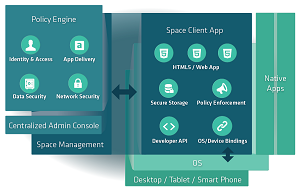News
Sencha App Platform Adds Desktop, Android Features
- By David Ramel
- October 30, 2014
With app management platforms proliferating in the new mobile-first era, Sencha Inc. has added some new twists to its offering such as including desktop applications in the mix and addressing the "Android fragmentation" problem with its Web-based cross-platform approach.
Sencha is known for its suite of mobile development tools targeting different platforms and OSes, choosing an HTML5-based approach where the browser is the application platform. That's in contrast to other mobile approaches where separate native apps are built for each target, or where hybrid apps use much of the same code base and are customized for separate platforms through different means, such as wrapping them in containers that access native functionality through JavaScript API calls or compiling them to separate native apps.
Along with pure development tools, more vendors are producing app management platforms that coordinate development with testing, auditing, deployment and other ancillary tasks.
With the new Sencha Space 1.2, the Redwood City, Calif.-based company has introduced new cross-platform features to its management platform.
 [Click on image for larger view.]
Sencha Space (source: Sencha Inc.)
[Click on image for larger view.]
Sencha Space (source: Sencha Inc.)
For example, Sencha has added the desktop as a targeted platform in addition to the typical smartphones and tablets running iOS, Android, Windows Phone and so on.
"Many organizations feel pressure to deliver the right user experience at the right time on the right screen -- including any desktop, tablet and smartphone," said Sencha's Nick Harlow in a blog post announcing the updated platform this week. "However, leaders in these organizations have frequently approached desktop and mobile application development as different silos. They employ different management and security technology to address deployment, data protection and compliance reporting needs, creating unnecessary complexity, costly administrative overhead, and unproductive friction between development teams."
To address that problem, Sencha introduced a desktop client application so users can use one integrated platform to deploy applications to mobile devices and desktops. With Sencha Space 1.2, users download an app for their device/desktop/laptop that's connected to a console used by admins to control user access to applications and data.
With this universal control, Sencha said it shields users from disruptive changes caused by rapidly evolving devices and platforms, including security-related considerations.
"Enterprise development and IT teams are challenged with satisfying many application requirements -- from delivering optimal UX to incorporating management and security functions, while ensuring apps run effectively across multiple screens, devices and platforms," the company quoted IDC analyst Al Hilwa as saying. "A cross-platform solution that integrates application management and security into the increasingly prevalent HTML5 capabilities will help enterprises implement an application-centric approach to securing corporate data while still allowing BYOD flexibility."
Those "increasingly prevalent HTML5 capabilities" are addressing traditional drawbacks to Web-based cross-platform apps, known for not providing native performance, access to all native functionality such as cameras and accelerometers, or native look-and-feel.
HTML5, a new standard that was just recently finalized as a W3C recommendation, has been making inroads in those problematic areas.
Another problematic area addressed by Sencha in this release is what it calls Android fragmentation.
"This release focuses on a problem unique to the major uptick in workplace BYOD (bring your own device) world: Android fragmentation, which makes apps appear wildly different, despite using the same operating system," said a company public relations representative in an e-mail. "An August 2014 study from OpenSignal found more than 18,000 different Android devices around the world -- a frightening statistic for the developers trying to service large, global businesses."
To tackle that problem, a new custom runtime for Android will "reduce the burden of the extreme Android platform fragmentation with a consistent, high-performance, Chromium-based runtime across all Android 4.x devices," Sencha's Harlow said.
That approach drew a favorable review from IDC analyst Hilwa. "I think the standard Android Webview component that Sencha adds will help in solving an important problem in hybrid HTML5 apps, namely inconsistent performance and varied implementations of the HTML5 across Android," Hilwa said in an e-mail to this site. "This and the remote debugging features added in this release of the product are important in moving the state of Web development on mobile platforms."
Other new features in Sencha Space 1.2 include on-premises administration, remote debugging support and new API additions to the Space SDK.
Sencha Space 1.2 is available for a free trial and ships in three editions including a free option for 10 maximum users.
About the Author
David Ramel is an editor and writer at Converge 360.